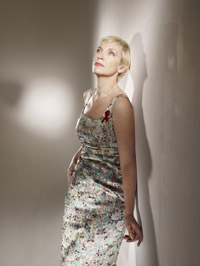 | |
| Photo courtesy of 19 Entertainment |
Best-known as the Eurythmics songstress, Annie Lennox is also an outspoken HIV/AIDS advocate. Her 2007 track “Sing” launched a campaign for African women and children affected by the virus (watch updates at annielennoxsing.com), and last summer, she attended the International AIDS Conference in Mexico City. Her latest disc, The Annie Lennox Collection, amasses 14 solo hits, including new single “Shining Light.” This spring, the selfless diva’s promotional tour doubled as a platform for HIV/AIDS awareness. We caught up with la Lennox for a quick update—and frank advice.
“Sing” launched your project to raise money and awareness of HIV/AIDS among African women and children. I saw your concert in New York for Songs of Mass Destruction, and when you were talking about HIV/AIDS, someone yelled out, “Shut up and sing!”—
Oh how rude.
—I’m hoping that was a drunken anomaly. Are people receptive to your advocacy work?
About 90 percent receptive. And then you’ve got the “shut up and sing” bunch. But hey, this is who I am, and that’s part of it.
Madonna sings on that track, and she’s been active in Africa. Have you two sat down, like over tea and biscuits, to discuss changing the world?
No, never.
You attended the International AIDS Conference in Mexico City last summer as an Oxfam ambassador. What was your message?
My message was this: Wake up Latin America! You have a really special window of opportunity at the moment to get the message out there, to prevent what happened in Africa. The most vulnerable segment of that population is married women. In Mexico City, we had a meeting of women from all across South America. I said, “Okay, put your hands up, those of you who know you were infected by your husbands.” Almost every hand went up.
Imagine this: There’s a woman in Latin America, a very machismo culture, and she’s dependant on finances of the husband. She gets infected through him, and he goes, “You whore! You’ve been sleeping around, I’m going to kick you out.” The people are terrified. Part of the stigma is that not only is AIDS a scary thing, but that you have to reveal your infidelity.
Your platform about HIV/AIDS in Africa has been based on women’s rights issues and on viewing the pandemic in terms of human rights.
It’s a human rights issue because people are dying. They can’t get access to treatment. They don’t know how to get it. And it’s not there. In the last 15 to 20 years, a whole generation of men and women have been wiped out and left millions of orphans. When it comes to Africa, you have endemic poverty and women don’t have political rights and don’t know how to organize themselves. Pregnant women [with HIV] present themselves at maternity hospitals, and they can prevent the baby from having the virus [by using] nevirapine. It’s an important first step. What I’m interested in is finding and supporting ways that can affect that wipeout factor.
In America at least, HIV has mostly been viewed as a gay disease. How do you think that has affected our ability to fight the epidemic?
Through advocacy, the gay community organized itself brilliantly and demanded its rights and said, “Hey guys, we need to protect ourselves and educate ourselves, and certain things need to be changed.” Mainly because of that, you have access to up-to-date medication that can extend and save lives.
Also, by they way, in the West, we don’t have the issue of malnutrition. In Africa they don’t have access to state-of-the-art medication and are still having to take the old-fashioned cocktails, which can have side effects.
But what I can gather from talking to some of my friends is that young [gay] guys are being very risky. That worries me. I could just ask you: Do you think that is because young guys think, “Hey if I catch the virus I can just take a pill; it’s like herpes”?
Sure, there’s that. But it’s complicated. The latest U.S. numbers show a big increase in men who have sex with men is among young blacks and Latinos, so cultural and socio-economic issues are at play. Also, most of the younger generation haven’t lost friends or lovers to AIDS. They don’t have that factor.
No, I don’t think they do. They haven’t seen people dying. [In the ’80s] people were dying left, right and center. People in music and fashion or anything like that, most of us know people who have died because of AIDS. A friend said in one year she lost 12 friends.
But it’s very dangerous that young guys are approaching it recklessly. If young boys are having unprotected sex now, it’s going to blow up in their faces. I know it! Shouldn’t the gay papers start the advocacy again? We have to keep the issue on the table, and it’s the hardest thing to do. Heterosexual community: Hello, wake up! Boys and girls, do you know where your partner has been? You don’t! It’s like, Fuck. It’s really scary.
You’ve never shied away from life’s unpleasantries. Your song “Dark Road,” which is on the compilation, explores the rough patches we all go though. So finally, What’ve been your highs and lows?
So many. My God, it’s been a rocky road. I can tell you that. The best thing in my life is that my children came into the world and they were healthy. Because the dark point obviously is I lost a child, a baby, and I don’t even have a word to describe that. It was a bolt of lightning through the blue. But it made me grateful for things I possibly took for granted before.
The Annie Lennox Collection is out now. For more information, to read her blog or to donate to Sing, visit annielennox.com.






Comments
Comments